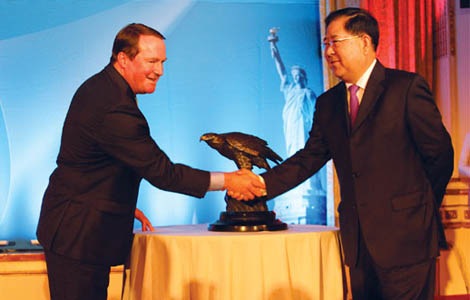Russia bans western food imports
Updated: 2014-08-07 21:40
(Xinhua)
|
||||||||
MOSCOW - Russian Prime Minister Dmitry Medvedev said Thursday that Russia is imposing a ban on food imports from the European Union (EU) and the United States, and considers an overflight ban for European and US airlines to the Asia-Pacific region.
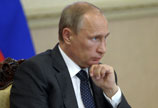 |
| Putin bans agricultural imports from West |
The Russian government imposed a one-year ban on imports of beef, pork, poultry, fish, cheeses, fruit, vegetables and dairy products from Australia, Canada, the EU, the United States and Norway, the Itar-Tass news agency quoted Medvedev as saying.
He said that Russia has long restrained from responding to the sanctions imposed by the West.
"I sincerely hope that our partners will change and stop thinking of intimidating and containing Russia, and that our mutually beneficial trade and economic cooperation will be restored in full," Medvedev said.
He added that "if our partners display a constructive approach toward cooperation then the Russian government will be ready to revise the terms of the imposed measures."
Medvedev warned of potentiality of more protective measures in aircraft building, shipbuilding, automobile manufacturing industries and other sectors, "but we will do this reasonably."
The premier called on all relevant federal administrations to work together with representatives of retail chains and commodity producers for joint action plan in order to replace banned imports and balance price as soon as possible.
Agriculture Minister Nikolai Fyodorov said later at a briefing that Russia's agribusiness may receive an additional 137 billion rubles (nearly 3.8 billion dollars) from the state in the next three to four years for output boost and a larger domestic market share.
He added that the import ban is supposed to trigger agricultural production growth in Russia, as the production volume will "reach 281 billion roubles (nearly 7.7 billion dollars) in the next 1.5 years."
Medvedev also expressed his confidence in Russia turning the situation in its favor even under western sanctions.
Meanwhile, Moscow is considering to impose an overflight ban on European and American airlines flights to the Asia-Pacific region, cut off trans-Siberian routes' usage and upgrade, as well as change Russia's airspace entry and exit points for European and American charter flights.
"These measures might not be introduced at once, but the Russian government might take them as response to sanctions imposed by the EU on Russia's low-cost airline Dobrolet, as such measures will significantly raise Western airlines' costs," said Medvedev.
Dobrolet airlines, the exclusive operator of flights between Moscow and Simferopol of Crimea, had to cease all its operations from Aug. 4 after it was blacklisted by the EU on July 30.
Western sanctions against Russia scaled up amid ceaseless armed fighting in eastern Ukraine and mounting international pressure on investigation of the downed Malaysian passenger plane MH17.
Russian President Vladimir Putin signed on Wednesday a decree banning or limiting the imports of agricultural products from countries that imposed sanctions on Moscow.
The move marked the first substantial response Moscow made amid rounds of sanctions imposed by the United States, the European Union, Japan and Canada over the ongoing Ukraine crisis.
An EU announcement released on Thursday said that the EU views Russia's food import ban as politically motivated, which was later refuted by Medvedev as "cynical."
The EU will start assessing the measures in the coming days and "reserve the right to take action as appropriate."
The EU envoy to Russia Vygaudas Usackas said that the ban will leave negative consequences on Russia, especially for ordinary Russian consumers as 40 percent of Russia's imported food comes from the EU, according to the Interfax news agency.
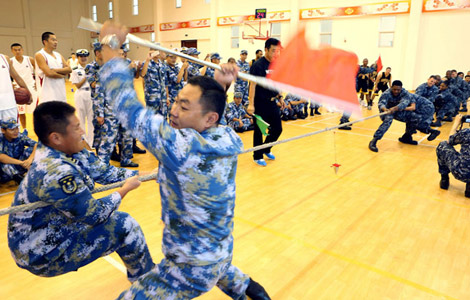
 Navy crews from China, US compete in matches
Navy crews from China, US compete in matches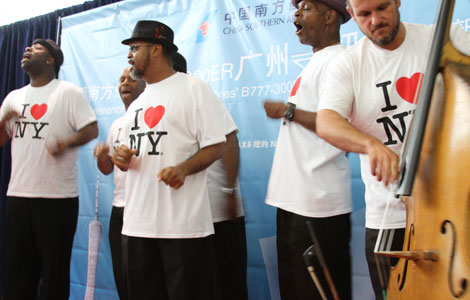
 Will Chinese tourists 'heart' New York too?
Will Chinese tourists 'heart' New York too?
 Mobile gamer iDream Sky raises $115m in IPO
Mobile gamer iDream Sky raises $115m in IPO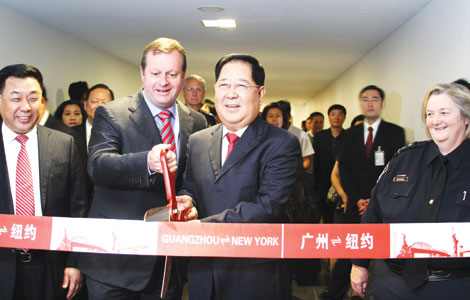
 China Southern launches Guangzhou-New York service
China Southern launches Guangzhou-New York service
 Chinese cadets' numbers rise in US military academies
Chinese cadets' numbers rise in US military academies
 US funded Chinese fashion website targets a new customer segment
US funded Chinese fashion website targets a new customer segment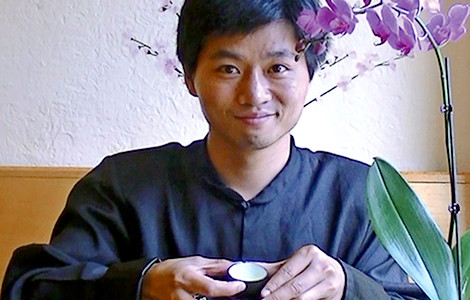
 'Dr Tea' takes on the US
'Dr Tea' takes on the US
 NYC spurs small business
NYC spurs small business
Most Viewed
Editor's Picks

|

|

|

|

|

|
Today's Top News
Pandas find friend in World Peace
Obama authorizes targeted airstrikes in Iraq
WTO nixes China rare earth bid
New Guangzhou-NYC flight 'a gift'
Will Chinese tourists 'heart' New York too?
Hagel in New Delhi to expand defense ties with India
Scale of Ebola crisis 'unprecedented'
China's mobile gamer lists at Nasdaq
US Weekly

|

|
